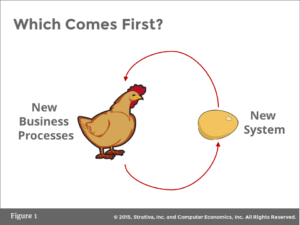…Or if not first, than pretty close to the top. The reality is that the focus is on implementation of the new system, not necessarily on the business process or workflows that make that system successful. It is a known fact among business owners that businesses need defined process to scale, and it is this scalability that allows for long term success. This is true in software implementation projects as well.
Let’s explore why that’s important.
- Without process there’s no definition and no roles – In lieu of no direction, nobody has responsibilities and nobody knows what to do. This leads to two issues: 1) everyone doing the same as what they did before the implementation and 2) people trying to be helpful by throwing everything over the fence to the next person (i.e. asking every person who has a remote possibility of understanding what to do), and hoping for a handoff. This just results in frustration all the way around.
- How do you implement the system workflows if you don’t understand the process? Many software systems (CRM, ticketing, ERM, BPM, etc) have workflows that need to get defined. If you don’t understand what the process is, or what you need it to be, how can you implement the workflows? While many of these workflows are changeable, it becomes more difficult to unravel once you starting using them.
- Reconciling buy-in – How do you reconcile buy-in from all the different stakeholders if you haven’t figured out what the process is, and therefore don’t know all the people it will touch.
I realize every day how hard it is to put process first. I often get caught up in the minutia of implementation, or other tasks at hand, rather than focusing on the big picture. Process needs to be a part of a project implementation as the software integration itself. Consider this from the beginning of the project and you’ll save yourself and your stakeholders a lot of grief.
